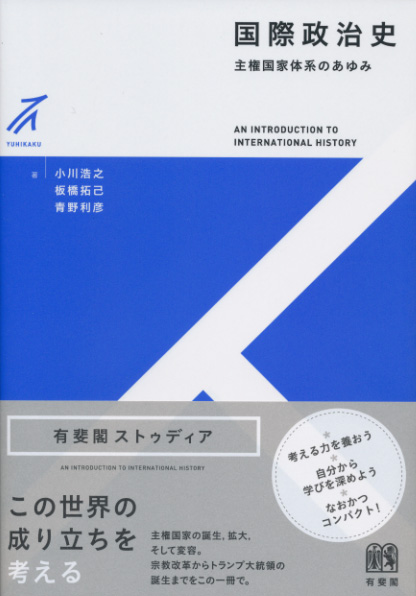
Title
Yuhikaku Studia Kokusai-Seiji-Shi (An Introduction to International History)
Size
344 pages, A5 format, softcover
Language
Japanese
Released
April, 2018
ISBN
978-4-641-15052-2
Published by
Yuhikaku Publishing
Book Info
See Book Availability at Library
Japanese Page
This book focuses on sovereignty and the sovereign state system formed by multiple sovereign nations — those relatively neglected amid globalization and the significant impact of global history on historical science — and attempts to clarify its establishment and development through history. Sovereignty is essential to understand contemporary international politics, as seen from the Trump administration’s “America first” policy, the insistence on “independence” by the UK's Brexiteers, and China's rapid maritime expansion. The Chinese government, for example, has positioned the issue of sovereignty of the Tibet Autonomous Region, the Xinjiang Uyghur Autonomous Region, Taiwan, Hong Kong, the South China Sea, the Senkaku Islands (the Diaoyu Islands), etc. as its “core interest,” making it clear that it will not make any concessions. It shows a strong commitment to the sovereignty of China — looking at Taiwan as an indivisible territory of China, restraining forces that seek Taiwan's independence, and the “One China” principle that prohibits countries having diplomatic relations with China from developing political relations with Taiwan. However, the importance of sovereignty in understanding today's international politics does not mean it is absolute, fixed, or static. Rather, sovereignty is an institution that has formed under certain historical conditions and transformed, at times quite flexibly. According to Robert Keohane, a scholar of international politics quoted in the introduction to this book, “Sovereignty is an institution created for international society; like other institutions, it undergoes change in response to environmental conditions” (Robert O. Keohane, Power and Governance in a Partially Globalized World, London: Routledge, 2002, p. 11).
Commitment to sovereignty was most typically seen in the post-World War II world in the relatively weaker nations in the Third World (or the Global South). For example, principles such as respect for national sovereignty and territorial integrity and non-intervention in internal affairs were rephrased and emphasized repeatedly in “the Declaration on the Promotion of World Peace and Cooperation” (Ten principles of Bandung) adopted during the 1955 Asia-Africa Conference. However, the need to repeatedly emphasize them to an extent that seems a bit redundant indicates how difficult it was for these countries to satisfactorily exercise their sovereignty in actual international politics. They were, as revealed through the empirical and broad perspective of Cold War historian Odd Arne Westad, subject to external interventions based on the universalistic ideologies of two superpowers, the US and the USSR (Odd Arne Westad, The Global Cold War: Third World Interventions and the Making of Our Times, Cambridge: Cambridge University Press, 2005), and even when they could avoid such interventions, they often lacked the ability to effectively govern themselves, and became what Robert Jackson referred to as “quasi states.” “Quasi states” are a concept in which Jackson extended Isaiah Berlin's discussion on “positive liberty” and “negative liberty,” identifying countries that could not exercise “positive sovereignty,” that is, did not possess the means and financial resources necessary to provide public goods to their citizens, even when enjoying “negative sovereignty,” which is to say, they did not face foreign intervention or interference. According to Jackson, “positive sovereignty” is “the distinctive overall feature of a ‘developed’ state” (Robert H. Jackson, Quasi-States: Sovereignty, International Relations, and the Third World, Cambridge: Cambridge University Press, 1990, pp. 26-31).
Of course, even developed countries are not immune to issues of sovereignty. To satisfactorily exercise “positive sovereignty,” large-scale budgets and central and local administrative organizations are usually necessary, which almost inevitably cause high tax rates and bureaucratic overgrowth. It will, therefore, be difficult to maintain the level of revenue and per capita social welfare provisions thus far, amid the declining birthrate and aging population (decrease in workforce and increase in the number of the elderly) in many developed countries. It is also not easy for developed countries to sufficiently exercise their “negative sovereignty.” For example, from the Cold War until today, there have been repeated public protests against the existence of US bases and associated accidents, crime, noise, and environmental pollution and destruction in the allies (or junior partners) of the US such as Japan, South Korea, the UK, Germany, and Italy. Existing US military bases and arrangements by which US soldiers stationed there are only partially subject to the host countries’ jurisdiction are stipulated in treaties such as the US-Japan Security Treaty or the Japan-US Status of Forces Agreement, or in international treaties (excluding secret agreements such as the one between Japan and the US that allowed bringing in nuclear weapons after Okinawa’s reversion to Japan). Such treaties are signed between the governments of sovereign states, ratified in accordance with their respective constitutional procedures, and registered and published by the UN Secretariat under Article 102 of the UN Charter. In that sense, they differ in many ways from the various unequal treaties concluded before World War I, which took effect through almost automatic ratification after being signed by government representatives and had no obligation to be registered and published by the League of Nations (later the United Nations). However, even if the international and domestic systems surrounding treaties and international agreements have changed significantly, their content reflects the power gap between the parties, and that is an immutable fact through the ages.
That said, America's “junior partners” concluded those treaties and agreements to ensure security through an alliance with the US, and were not victims of unilateral imposition of adverse conditions. Rather, despite the large disparity in power, there was potentially a perspective that the “junior partners” had successfully “invited” the US for the security of their own countries, through limited concessions (For a discussion on an “empire by invitation,” see Geir Lundestad, “Empire” by Integration: The United States and European Integration, 1945-1997, Oxford: Oxford University Press, 1998, ch.4). Furthermore, if war were to break out, considering that human rights and the environment are often the worst casualties, downplaying the significance of security owing to the US military’s presence could mean, in addition to the damage to human life and property, disregard for human rights and the environment. The gap between conservatives and liberals on security issues is often deep, but a way to bridge it is to view sovereignty as a relative and flexible institution. If we recognize that sovereignty is an institution for certain purposes and that what is most important is not only human life and property but also individual human rights and understand that the environment is more than just human beings, dialogue will be possible provided that both sides are prepared to reflect on how to best achieve these two goals. In any case, on “negative sovereignty,” many settings of the current status quo display the restrictions that have accompanied alliances with the US (at least formally, based on agreements between parties). These issues are undoubtedly concentrated in Okinawa, where about 70% of exclusive-use US facilities in Japan exist on approximately 0.6% of its land area.
The discussion on theory and practice concerning sovereignty is somewhat limited in this book, as it rather focuses on the international political history over the five centuries from the Reformation to the beginning of the Trump administration. Of course, the above discussion is very fragmentary and tentative. Despite the obvious inadequacy, however, I am grateful for the opportunity to reexamine and write about the continuation and transformation of sovereignty and the sovereign state system in the contemporary world, and examine the various issues surrounding them.
(Written by OGAWA Hiroyuki, Associate Professor, Graduate School of Arts and Sciences / 2020)



 Find a book
Find a book


 eBook
eBook